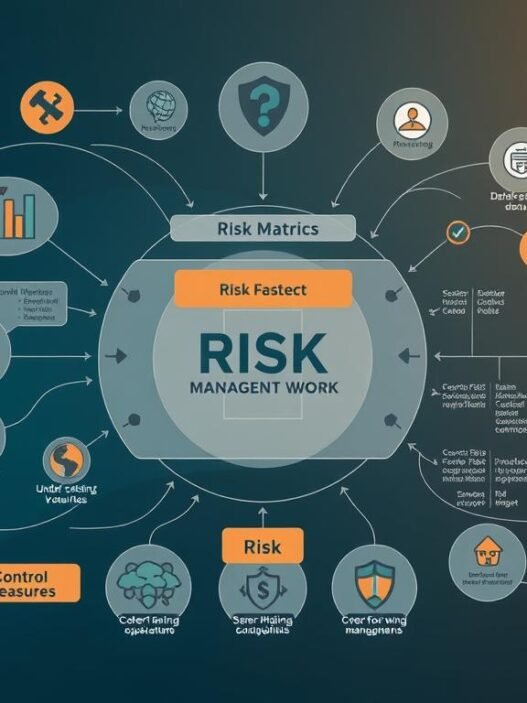Did you know that only 30% of Americans have a financial plan? This means most people are at risk of financial surprises. Financial planning is key in uncertain times. It helps you plan for the future and reach your goals.
By planning well, you can handle unexpected events, grow your wealth, and secure your retirement. This makes your financial life more stable. In today’s changing world, smart financial planning is not just good; it’s necessary1.
Key Takeaways
- Only 30% of Americans currently have a comprehensive financial plan.
- Effective financial planning helps achieve long-term financial goals and aspirations.
- Comprehensive financial strategies can prepare individuals for unexpected life events.
- Financial planning contributes to wealth cultivation and stable retirement.
- Adopting modern financial strategies is essential for navigating today’s economic landscape.
The Importance of Financial Planning
Getting a grip on financial security means planning smart. It’s about setting goals, checking your finances, and working towards those goals. Getting help from experts can make your decisions better and your results stronger2.
Understanding Financial Security
Financial planning is key. It gives you a solid plan for your money’s future. Sadly, only 33% of Americans have a financial plan3. But, those who do feel much more secure about their money3.
Knowing how to manage your money helps you reach big life goals. It’s about being ready for surprises like emergencies or retirement4.
Current Financial Landscape Facing Americans
The financial scene in America is tough. High student loans and shaky economy make planning essential. Studies show people with financial advisors make better money choices and feel more secure3.
Financial plans also help you deal with inflation and market ups and downs. This way, you’re ready for any financial bumps in the road4.
Key Components of Comprehensive Financial Planning
Financial planning is about setting up a solid financial future. It starts with
setting clear financial goals
. Having short-term, medium-term, and long-term goals is key. Short-term goals are things you can do in a year or two, like paying off debt or saving for emergencies.
Medium-term goals might take three to ten years, like saving for a house. Long-term goals are for big things, like retirement or paying for college56.
Create a Budget and Monitor Spending
After setting goals, making a budget is crucial. A budget helps you keep track of your money. It makes sure you’re on the right path to meet your financial goals.
Studies show that without a budget, it’s hard to stick to spending and saving plans. Watching your spending helps you make better financial choices7.
Establish an Emergency Fund
Having an emergency fund is also key. Experts say to save enough for three to six months of living expenses. This fund helps you deal with sudden costs, like medical bills or losing your job.
Financial Education: A Foundation for Future Success
Financial education is key for the future of young people. It helps them plan their finances well. In teen financial literacy, there are worrying trends. For example, only 34% can answer basic financial questions like interest rates and inflation, down from 42% in 20098.
Also, 73% of teens want more personal finance education. This shows how important it is to have good financial education programs9.
Statistics on Teen Financial Literacy
Teen financial literacy faces big challenges. Financial anxiety affects 77% of Americans9. One in five American teens lacks basic financial literacy skills. This highlights the need for focused education9.
By learning about finance early, teens can gain important skills. These skills will help them in adulthood.
Benefits of Financial Education Programs
Being part of financial education programs boosts personal finance skills. It teaches teens about budgeting, saving, and investing. Programs like SecureFutures give teens the confidence to handle financial issues.
People who join these programs make better financial choices. This leads to healthier financial habits as they grow up.
Financial Planning and Debt Management
Managing debt is a big challenge in personal finance. Knowing what you owe is the first step to managing it well. You need to plan your finances carefully to tackle all your money commitments.
Identifying Your Debt Obligations
Many people have different debts like credit cards, mortgages, and student loans. Knowing what you owe helps you manage it better. This step is key to making sure your financial plan matches your goals.
Strategies for Managing Student Loans
Student loans can be a big stress for many. There are ways to make things better, like refinancing or income-driven plans. Using the avalanche or snowball method can help you pay off loans faster, by focusing on high-interest or small debts first10.
Many feel the weight of these loans on their current and future finances10.
Effects of Debt on Retirement Planning
Debt can really hurt your retirement plans, making it hard to save. Many worry about paying off debts and saving for retirement at the same time11. Planning carefully and managing your debt can help you save for the future.
Getting help from a financial advisor to look at options like debt consolidation can be smart12. The aim is to balance paying off debt and saving for retirement, keeping your finances healthy for years to come.

Investing for Long-Term Goals
Success in achieving financial goals often starts with long-term investing. Stocks, bonds, mutual funds, and ETFs are key for building wealth. They offer growth and diversification, which helps reduce risks. Knowing these options is crucial for a strong portfolio.
Understanding Different Investment Vehicles
Investing for long-term goals means looking ahead ten years or more. The U.S. stock market has shown growth over time13. Investors can choose from various funds, like those focused on stocks, bonds, or money markets, to meet their goals.
High-yield savings accounts offer more interest than traditional ones, making them good for short-term goals13. Investors with different risk levels can find the right mix through modern portfolio theory13.
Risk Tolerance and Investment Strategies
Risk tolerance is key when picking investments. It changes with life stage, income, and goals. For example, younger investors focus on saving for retirement, while older ones aim for milestones14.
Finding the right balance between risk and growth is crucial for financial health. Long-term investors use funds they won’t need soon, allowing them to weather market ups and downs13.
Creating a plan with a mix of investments based on risk tolerance is vital for long-term success. Understanding different investment types helps achieve both short and long-term goals. This mindset is key in today’s financial world.
Read the Terms of Use for more insights on investing.
Retirement Planning Essentials
Planning for retirement is key to financial security. Knowing your options and how much to save is crucial. It helps prepare for life without a steady income.
Understanding Retirement Account Options
Popular retirement accounts include 401(k)s, IRAs, and Roth IRAs. Each has its own benefits. For example, those over 50 can add extra to their IRAs or 401(k)s16.
This extra contribution can help boost savings as you get closer to retirement.
How Much Should You Save for Retirement?
Figuring out how much to save varies by person. Experts suggest saving at least 15% of your income. Your lifestyle, retirement age, and expenses play a role in this number.
Setting SMART goals can make planning more effective16. Keeping a budget and checking your savings regularly is key to staying on track.

It’s also important to plan for managing your money in retirement. Strategies like diversification can help protect your savings from inflation and market ups and downs16. Talking to a financial planner can offer valuable advice for adjusting your plans as life changes.
Insurance as Part of Financial Planning
Adding insurance to your financial plan is a smart move for managing risks. It helps keep your finances safe from surprises by offering the right protection.
Types of Insurance to Consider
There are many insurance options to think about in a solid financial plan:
- Health Insurance: It’s key for covering medical bills, which have gone up a lot. This can really put a squeeze on your wallet.
- Life Insurance: It gives a tax-free sum to help your loved ones after you’re gone. It’s especially important for those with big assets17.
- Property Insurance: It guards against losing money to fires, theft, or natural disasters. It keeps your valuable stuff safe.
- Long-Term Disability Insurance: It helps keep your income flowing if you’re out of work for a long time. This lets you focus on getting better without worrying about money.
How Insurance Protects Financial Health
Having the right insurance is crucial for keeping your finances in check. Life insurance, for example, helps manage estates by keeping death benefits steady18. It also protects your assets and can even help with investments, like diversifying your portfolio18.
Long-term care insurance is also important for planning. It covers future needs and can save you money in the long run18. With healthcare and property costs going up, having the right insurance is key for managing risks and keeping your finances healthy.
| Type of Insurance | Coverage Benefits | Key Considerations |
|---|---|---|
| Health Insurance | Covers medical expenses and emergencies | Rising medical costs and inflation rates |
| Life Insurance | Financial protection for dependents | Estate tax planning and income replacement |
| Property Insurance | Protects against loss from hazards | Asset value and potential risks |
| Disability Insurance | Income coverage in case of disability | Length of disability and customization of policies |
In short, making insurance a key part of your financial plan is smart. It helps you stay financially stable even when things get uncertain181719.
Tax Planning Strategies
Tax planning is key to managing your finances well. It helps you make the most of your investments and keep your taxes low. By managing your income wisely, you can cut down on taxes a lot. This is done by choosing the right business structure and using all available deductions and credits20.
This smart approach can reduce taxes by up to 40% for business owners20.
Understanding Tax Implications of Investments
Knowing how different investments are taxed is crucial. In 2023, long-term capital gains tax rates range from 0% to 20%, depending on your income21. Using tax-loss harvesting can lower capital gains tax by up to 15% each year. This is important for getting the most from your investments20.
Also, using retirement accounts wisely can increase your savings by 25% compared to not contributing20.
Maximizing Tax Benefits and Credits
It’s important to use all tax benefits you can to lower your taxes. Bunched deductions can save up to 10% of your total tax liability each year20. Proactive tax planning can also increase tax savings by 20% for small business owners20.
The IRS offers many deductions and credits, like for education and charity. These can give you a big financial break22.
The Importance of Compliance
Following tax laws is crucial to avoid penalties and keep your finances healthy. Adjusting your W-4 form helps you withhold the right amount of taxes. This ensures you meet your tax obligations and keeps your cash flow steady22.
Staying updated on tax law changes can also save you about 10% in taxes. This is especially true for small business owners who adjust their strategies20.
Seeking Professional Financial Guidance
Working with a financial planner can really boost your financial plan. Many people handle their money well, but some moments need expert advice. Times like getting married, buying a home, or planning for retirement are key. A financial advisor can offer plans that fit your specific situation.
When to Consult a Financial Planner
Knowing when to get a financial planner is important. Here are some times when it’s a good idea:
- Going through big life changes like marriage, divorce, or having kids.
- Planning for retirement and figuring out how to manage your accounts.
- Thinking about big investments or buying a lot of assets.
- Dealing with sudden financial problems like a medical issue or losing a job.
- Wanting to boost your savings and investment plans.
How to Choose the Right Financial Advisor
Picking a financial advisor needs thought. Look at these key points before choosing:
| Criteria | Importance |
|---|---|
| Qualifications | Make sure they have the right certifications, like CFP. |
| Experience | Check their years of experience and what they specialize in. |
| Fee Structure | Know how they get paid; it might be a flat fee, hourly, or based on assets. |
| Fiduciary Duty | Check if they must act in your best interest. |
| Client Reviews | Look for feedback from past clients. |
Choosing the right financial planner can give you valuable advice and plans that match your goals.
Professional financial advice is crucial, as shown by groups like the Financial Planning Association (FPA). They gave free advice to almost 12,000 people in 2020, helping them with financial issues23. Services like NerdWallet also aim to make financial choices clearer, helping you make better decisions24.
Tools and Resources for Effective Financial Planning
Using advanced technologies and educational resources can make financial planning better. Tools like budgeting apps and investment platforms help manage money. They give insights into spending and investing. Financial technology makes it easier to get real-time data for better decisions.
Technology’s Role in Financial Planning
Financial technology brings new ways to manage money. Apps like Mint, YNAB, and Personal Capital help track spending and save more. People using these tools save about 15% more25.
Tools for budgeting and investing are key. For example, 75% of financial planners say making a budget is crucial25. It helps build emergency funds, aiming for one month’s expenses26.
Accessing Educational Financial Resources
Getting the right financial education is vital. Workshops and online courses teach about markets, investments, and managing debt. This knowledge is key to successful financial planning, with 85% of plans including diversified investments25.
Those with education are more likely to manage money well. They understand the 50/30/20 rule for budgeting26.
Conclusion
Financial security comes from good financial planning. It includes budgeting, investing, insurance, and smart taxes. It’s not just about numbers. It gives people the confidence to reach their goals and handle life’s financial challenges2728.
Those who plan their finances well feel more secure and at peace. They know they can handle risks and make smart choices27. By learning about money and using resources, they can manage their finances better. This helps them meet both short and long-term goals28.
Investing in financial planning means more than just getting by. It sets you up for success in a stable financial world2728. It helps you build a safe financial future for yourself and your loved ones.
















